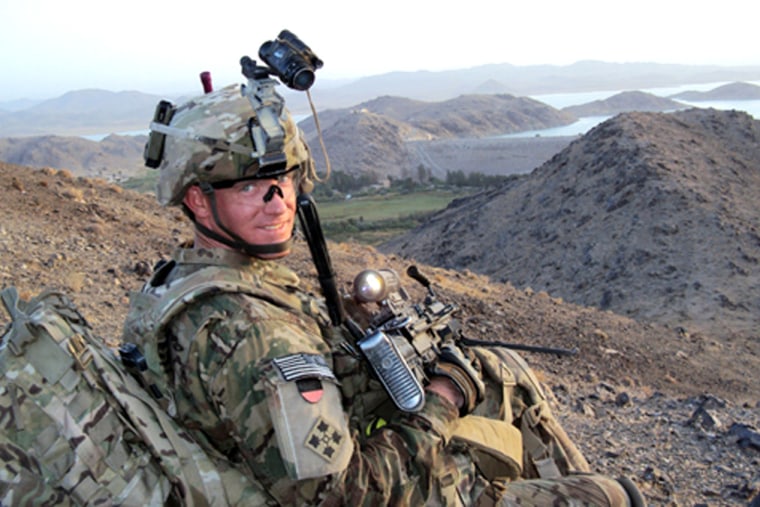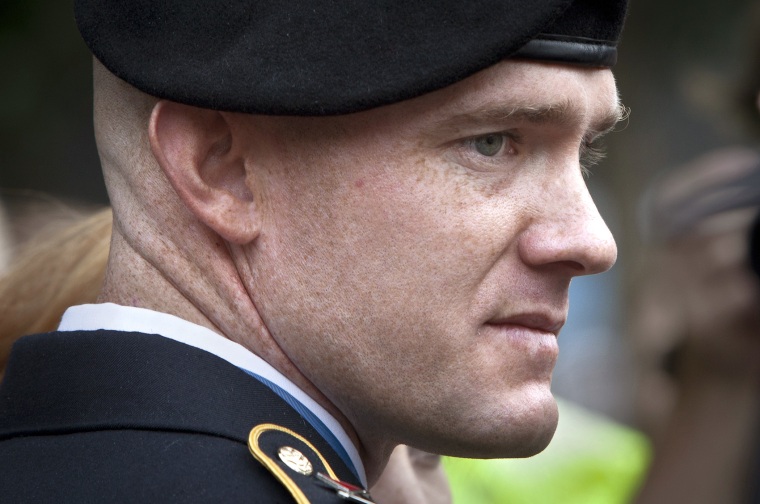Moments after Staff Sargent Ty Carter was celebrated by President Obama for “acts of valor” – the best phrase the military has to describe the mental toughness and personal bravery that is rewarded with a Medal of Honor – Carter showed he had one more in him.
He thanked his therapist.
“Only those closest to me can see the scars that come from seeing good men take their last breath,” Carter said at the White House ceremony in August. “However, thanks to the professionalism of my platoon sergeant, Sgt. Hill, my behavioral health provider, Captain Cobb, and my friends and family, I will heal.”
Carter is the first to acknowledge that he’s made strides combating the effects of post-traumatic stress since the Oct. 3, 2009 battle at Combat Outpost Keating, for which he was awarded the nation’s highest military honor. His mission now is to shed light on an effect of combat that’s been ignored, belittled and stigmatized.
Since the attacks of Sept. 11, 2001 drove more than 2 million service members into combat zones, nearly 30% of veterans of the wars in Iraq and Afghanistan who were treated at V.A. hospitals have been diagnosed with PTSD, according to a report issued by the Department of Veterans Affairs last year. Yet the post-traumatic stress–brought on by life-threatening events–can occur in anyone. Nearly eight percent of Americans will experience PTSD in their lifetimes, according to the Nebraska Department of Veterans' Affairs.
"It's not just a problem that combat veterans go through," said Dr. Rachel Yehuda, a professor of psychology at Mount Sinai Hospital. "Chances are, you know somebody who has PTSD or will develop PTSD in their lifetime."

In the face of increased public awareness, the military has moved to change the way it treats post-traumatic stress. On Wednesday, the Department of Veterans Affairs announced the hiring of 815 “peer specialists and peer apprentices” –veterans who have dealt with their own mental health issues for a minimum of one year. The additional resources will help guide service members to the mental health care they need.
Carter filled a similar role when one of his soldiers had “suicidal idealizations.” The 32-year-old was assigned to escort the soldier to Afghanistan’s Kandahar Airfield, and then on to Germany for medical treatment.
“By my last deployment I saw what everybody tells me: that the Army treats (PTSD) as a combat wound,” Carter, now 33, said in an interview with msnbc. The soldier in Carter's care who needed treatment for PTSD “was actually treated as if he had a life-threatening wound.”
“He got Medevac’d by helicopter, he got placed on a stretcher, they made sure he had an IV, made sure they checked his heart rate, that he was strapped down,” Carter said.
When they arrived at a U.S. base in Germany, Carter said the soldier was kept with others being treated for broken legs or bullet wounds and was given the same privileges, including joining the Wounded Warrior program.
“That impressed me immensely,” Carter said. “I thought it was an excellent testament to how the army is now viewing this kind of thing."
Recognizing PTSD (or PTS, as many veterans prefer to call it) as a combat wound is new territory for the military. The disorder itself wasn’t identified until 1980. But the change has opened the door to better benefits for many. A group of Vietnam Veterans, discharged under other-than-honorable conditions, filed a class action lawsuit last year against the armed forces, calling for their charges to be upgraded. More than 250,000 Vietnam veterans were discharged under that status, barring them from disability benefits, education assistance and military burials.
Even decades later, soldiers are struggling to understand post-traumatic stress in their ranks.
"The noises become too loud, the lights are too bright, the edges of the tables and walls are too sharp, and everything seems like it’s dangerous."'
“I thought it was something that soldiers would do to get out of work,” Carter remembered thinking before he was deployed. “I was very ignorant. I believed it was an excuse, or if you had it, there was something that was wrong with you, or some chemical imbalance that needed to be treated with medication.” He worried that if someone saw or heard he was going to behavioral health, he would be thought of as weak. “I didn’t get a whole lot of that,” said Carter, the fifth living recipient of the Medal of Honor for actions during combat in Afghanistan.
But that stigmatization keeps others from seeking help, and even with medical attention, recovery is fragile.
The legacy of the soldiers who fought at COP Keating is impressive: two Medals of Honor, nine silver stars, 27 purple hearts, eight bronze stars with valor, three bronze stars, and 37 army commendations with valor. "More than half of us were wounded," Carter said at the White House in August, "and almost everyone was left with a deep invisible wound to their hearts, to their minds."
When 300 insurgents attacked on October 3, 2009, forcing their way into the notoriously vulnerable outpost located deep in a bowl in Afghanistan's Nuristan Province, Carter sprinted time and again through a 100 meter stretch of enemy fire to retrieve ammunition for his fellow soldiers. He laid down his rifle and carried wounded Specialist Stephen Mace through a hail of gunfire back to the cover of their bullet-ridden Humvee, providing life-extending aid to the 21-year-old.
Mace ultimately died that day, after being flown by helicopter to a nearby base. There the young soldier who wore a St. Christopher medal around his neck was given the last rites.
Mace’s mother, Vanessa, told Carter that he saved her son’s soul.
The soldiers stood their ground for 13 hours. Of the 53 men who defended the outpost on Oct. 3, eight died—but Carter refers to fellow soldier Pvt. Ed Faulkner, Jr. as the ninth victim of the battle at Combat Outpost Keating.
Faulkner was the winner of two purple hearts – one from being wounded in Iraq and one in the battle at Afghanistan’s COP Keating – but an addiction to drugs ended his career. The Army discharged him honorably, and he sought treatment at V.A. and other hospitals. But the scars of battle remained, so much so that his mother once found him crouched outside the house in a defensive position, with his imaginary gun trained on an imaginary enemy.
Faulkner ultimately overdosed on methadone and Xanax in September 2010. He died less than one year after the battle at COP Keating.
“I did what I could to get Ed Faulkner’s parents to be referred to as Gold Star Parents, because even though their son died after combat, after the army, it was because of post-traumatic stress,” Carter said. “He had two purple hearts…and he gets home and he gets into this downward spiral... [But] when he was with us, his military family, he had that support network, so he was able to be ok."
Nearly four years after the battle at COP Keating, Carter is calm and resolute but candid about the suffering that comes from PTSD.
“Things become heightened around you. The noises become too loud, the lights are too bright, the edges of the tables and walls are too sharp, and everything seems like it’s dangerous or something is trying to hurt you or get you. You see people who would normally seem harmless, they turn into the biggest, meanest bad guy there is, and all you want to do is find ways to defend yourself.” Carter said that "it’s the people around you who notice it” first.

“My triggers were anything that reminded me of my daughter." He spoke of the fear of dying, of his daughter growing up fatherless. "That would break my heart. I would have an involuntary emotional reaction just in random places, for random pictures, or events, or anything like that so it would hurt me physically,” Carter said. He is committed to eliminating the stigma associated with post-traumatic stress.
“One of the big things that I’ve been trying to do is eliminate the 'd' in post-traumatic stress disorder. It’s completely normal. It’s actually a completely natural reaction” to a traumatic event, he said.
Carter and his wife Shannon are raising five children on their farm in Yelm, Washington, and Carter is still active duty. Shannon said the Medal of Honor was a recognition that Carter wouldn't let go to waste. It will “make a lifelong of good come out of a very, very bad day.”
